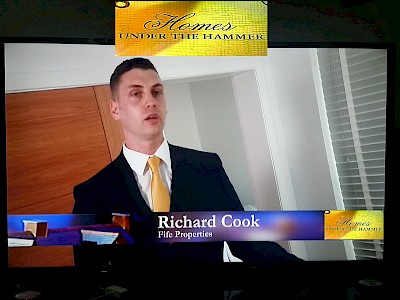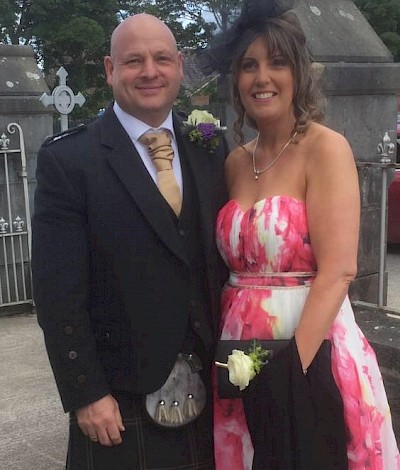Testimonies
Gillian Campbell, Seller: I have now sold two houses using Fife properties and have always found them to go above and beyond my expectations. Jim Parker has integrity and honesty.
Paul Young, Seller: Great service and got a great price for our property.
Fiona Napier, Seller: Excellent customer service. High standard of marketing, including photographs, video walk-through and property description. Great communication from all staff. Ann-Marie is a Great negotiator. Friendly and approachable. Pro active communicator.
Karla Reekie, Seller: Excellent service very professional I have sold and bought 2 properties with fife properties would not go anywhere else a very happy customer.
Iain Simpson, Seller: From start to finish Fife Properties we're great, especially Sophie. Sophie was great right through the whole process. Friendly, informative and professional. Thank you.
Kerry Fettes, Seller: Outstanding service, professionalism, marketing, communication and GREAT people!! Absolutely brilliant in every way.
Alison Boyle, Seller: Fife Properties operates a proficient and professional estate agency. My house sales journey was seamless throughout the entire process from being introduced to the videographer to the surveyor all proceeded without any hitches. The team exceeded expectations by demonstrating outstanding listening and communication abilities. They have excellent knowledge of the property market and any current trends and identify potential buyers in super quick time by their ability to research and network with others in the UK and further afield. Susan went above and beyond to secure our house sale and helped us feel connected by updating us on a regular basis. Selling your house can be a stressful process, however Susan ensured through her dedication, professionalism and care that this was minimised as much as possible. Not only did she sell our home she kept us appraised of the next steps and timeline to support any future planning related to our move. She is very deserving of this accolade and recognition. Thank you for everything.
Iain Murdoch, Buyer: A seamless experience thanks to agent Sophie Gibbens. From start to finish Sophie simply couldn't have been more helpful. Excellent communicator gave quick and clear responses to questions asked and represented Fife Properties in a thoroughly professional manner. It's a stressful situation when buying a property and Sophie smoothed the way all the way!
Stacey Bruce, Seller: The whole team were incredibly friendly and supportive throughout the whole process of selling our house! Everyone was super helpful, and were always happy to answer all our questions and help and advise us wherever they could. They made the whole process so simple straight forward, which we deeply appreciated as this can be a stressful time for anyone. I have recommended Fife Properties to everyone I have spoken to since selling!!
George Carmichael, Seller: From start to finish, we were blown away by the services provided by Jim and his team at Fife Properties. We were advised of some minor changes prior to Jim recording a complete walkthrough video of our property. This gave our viewers a much better insight into our property and surroundings. We can't rate Fife Properties highly enough and would highly recommend to anyone looking to sell their home.
Grant Ward, Seller: Working with Fife Properties was a positive experience from start to finish, beginning with Jim's initial visit to view the property when his enthusiasm together with his detailed and up-to-date knowledge of the local housing market really shone through. The advertising of the house was excellent and the video walk-through posted on social media got a huge number of hits online before the listing went live on Rightmove. This helped reach a wider audience at a time when market conditions were becoming much more difficult with interest rates and mortgage costs both sharply on the rise. There was regular communication from the team in the Cupar office and a sale was agreed within a month of the house going on the market. All in all, I can recommend Fife properties wholeheartedly. Susan is Friendly, helpful, knowledgeable and always at the end of the phone or an email if advice or just an update was needed.
Wendy Lowe, Buyer: I found when dealing with Fife Properties that they responded quickly to any questions we had. Ann-Marie shifted around a very busy schedule for me to see a property (which we subsequently bought) as I was only available on one day and time slot!!
Warren English, Buyer: We found Fife Properties to be pleasant and easy to deal with. They arranged viewings on the property we wanted to buy promptly and they were honest and fair when liaising and negotiating with us on behalf of their vender. Susan was polite and helpful, negotiating our purchase. She also helped us to find a local solicitor and helped guide us with local knowledge and the Scottish conveyancing process.
Alexander Love, Seller: They were really quick to visit us re quote to sell the house. Everything was explained well and overall cost was competitive. Went with them as felt they had the biggest reach on the Internet which included a video walk through and all reviews of them were good. House was presented well on the sites which generated good levels of interest. We were kept up to date on all upcoming viewings and what happened along with any offers etc. Made the overall selling process very easy.
Michelle Kinmont, Seller: Could not recommend Fife Properties highly enough, from start to finish they were amazing. My property went on Rightmove on the Tuesday & we had an offer on the Friday! They made the process straight forward, hassle free & stress free.
Stacey Muir, Seller: Service was excellent from start to finish, our property sold within days, the staff were friendly and efficient. The video they made of the property was fabulous. Thanks for all your help making the process stress free and easy. Would highly recommend.
Ken Gillies, Seller: Sold in 3 days for way over asking price. Jim Parker has good presentation skills , knows the local market inside out .Buyers lined up to view as soon as property went live. Offers received next day.
David Allan, Seller: Superb team who are always professional, helpful and friendly. The team has looked after my rental properties and recently sold one for me and kept me right every step of the way.
Amy Anderson, Seller: I had a great experience with Fife properties. As I was selling my first home they were very good at explaining how everything works and keeping me updated on offers people had made on my flat. I made way above the home value price of my property which was a great bonus!
Jim Hellicar, Seller: Fife Properties use social media to maximise the client base for selling houses and proves to be very effective. It does all come down to how well the property is portrayed on the internet and Jim has a natural ability to maximise the benefits of your property.
Jane Reid, Seller: Professional friendly & polite staff who dealt with the process of selling our house from start to finish efficiently. They lead us through the process keeping us up to date at all times. I would highly recommend this company to anyone looking to buy sell or rent their property.
Sandy Cormie, Seller: Professional and friendly service from beginning to end.
Andrew Nisbet, Seller: Jim and his team go above and beyond for their clients.
Caroline Hodge, Seller: Great experience and information on the selling of our property in such a great record timescale.
Jenny Robson, Seller: Excellent service provided whilst buying and selling through Fife Properties! No stress and always happy to help. Not the first time I have used Fife Properties and wouldn't hesitate to use again. All of the team were great and always kept us in the loop or assisted if we needed something. 10/10!
Ken Smith, Seller: From deciding to sell, right through to completion we were kept up to date and any questions we had were answered quickly, at every stage, even after five weekdays and at weekends. The photos and videos were outstanding, and our house sold in only two days. Great job! Ann-Marie was available to us at almost any time of the day, was very knowledgeable and gave us a first class service as well as re-assurance when we had any questions.
James Hutton, Seller: The enthusiasm of Jim Parker is infectious across his whole team. Our house in Crail was sold within a week of listing and the office team was very helpful across the whole process. Would recommend this first-class estate agency as the first stop when selling your home. The whole team work well to make a great experience.
Danielle Kerr, Seller: Jim and the rest of the team at Fife Properties were brilliant from the first point of contact right through to completion. Their local market knowledge is second-to-none, and they demonstrate a high level of customer care and great service.
Rosie Hutton James Hutton, Buyer: I sold my property in Crail within the week of its listing. Wouldn't hesitate to recommend Fife Property. It exceeded our expectation on every Level.
Avril Moore, Seller: Having been with 2 previous Estate Agents we found Fife Properties OUTSTANDING in their Commitment , Communication and Professionalism in all aspects of selling our house. We can highly recommend Fife Properties to do a great job... I have to mention that ALL members of Fife Properties have gone beyond their norm. Thank you to you all !
Gavin Hodge, Seller: I was wowed with Jim Parker's professional approach and imagination in marketing my property. The company provided all the support I needed in a friendly and understanding manner. I will certainly contact FP first when I come to sell my present home. Tnx for a great job.
Sandra Dye, Seller: From the initial enquiry re selling our property, getting it on the market and subsequently getting viewings, the service was excellent. I often emailed at nights and weekends not expecting a response until the next working day but someone always came back to answer my query. Anne Marie was brilliant from start to finish. She was always available to answer any queries.
Ann Barnes, Seller: Proactive marketing strategies, leading to a quick offer, realistic negotiations to achieve a fair price, always efficient and friendly in communications.












